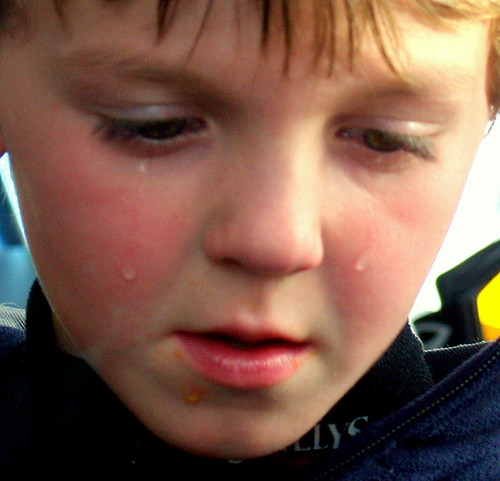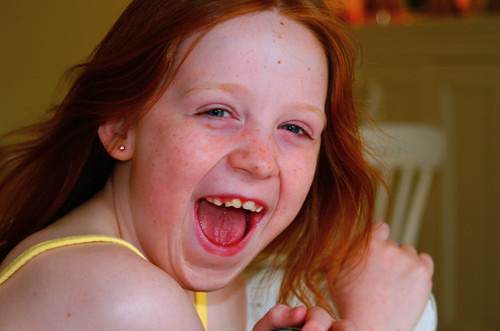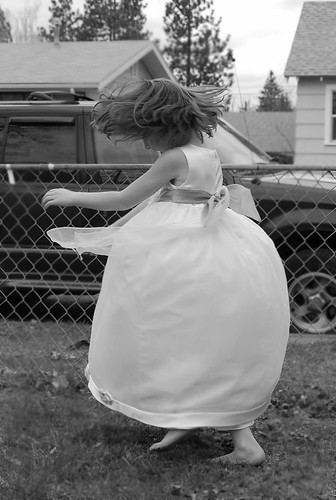 |
| Image credit david shankbone on Flickr |
This is unhealthy and inauthentic--carried too far and we become dishonest and emotionally crippled. But at the same time, we want to teach our children healthy ways of expressing their feelings that won't result in harm to people or property, and to demonstrate self-control. It isn't impossible, but it does take awareness, empathy and intentional teaching.
First of all, we must listen. The real need behind our child's behavior is to be understood. And most of us will try harder and harder to express ourselves if we aren't being heard. Even if your child is nonverbal, doing the best you can to convey understanding (without feeding drama) is essential.
We need to be able to recognize different emotions and label them for our children. It is important for them to have words to describe their feelings. We may start with just a few basics, like happy, sad, angry, scared, frustrated, but I think we should give them as many precise words as we can.
 |
| Image credit apdk on Flickr |
When our needs are not being met, we might feel: afraid, aggravated, agitated, angry, anguished, ashamed, bewildered, confused, cross, dejected, disappointed, edgy, embarrassed, exasperated, exhausted, fidgety, forlorn, frustrated, furious, heavy, helpless, horrified, jealous, lonely, mad, miserable, mopey, nervous, overwhelmed, resentful, sad, troubled, upset, weary, worried.
Even the most accurate words are not always enough when you are in the grip of an intense emotion, though. I speak two languages and still have difficulty articulating my deepest feelings! It is unrealistic and unhelpful to always expect children to "use their words". Sometimes we have to use our whole bodies.
 |
| Image credit waponi on Flickr |
When my daughter was going through an anxious time, it helped her to be able to squeeze her palms together or press them against her knees as part of a calm-down ritual. Sometimes just have a couple of familiar steps can be very soothing: a deep breath, squeezing palms, a cup of tea.
I want my children to feel free to seek connection with us when a feeling is too big for them. As a huge introvert who often prefers to be alone, though, I respect their desires. Setting up a comfort corner where they can cool off or retreat and relax in can be extremely helpful. A nice beanbag or favorite pillows, a calm down jar, maybe a little hideaway where they don't feel scrutinized, or even a warm bubble bath can provide a chance to unwind.
Do you have little artists? Let them go to work with fingerpaints or other materials to show you exactly what they are thinking and feeling! If they are old enough to write, they may want to pour out words in a journal or letter.
This next part may seem like a bit of a tangent, but it is important: fear exacerbates all other big feelings. One of the toughest jobs (at least for me--I am a bit of a coward here) is teaching them how to create and maintain boundaries, and backing them up while they do it. If someone has wronged them, they may need your help in navigating appropriate ways to respond.
For parents, the easy way out is to suggest that the child "forgive" and pretend it didn't happen. That protects us from any messy confrontation. The problem? At best, it is damaging. It prevents our children from learning healthy ways to deal with conflict. At worst? It is devastating when our children absorb the message that we would rather have other people mistreat them than face any discomfort. I'll spell it out further: I have heard personally from several adults who were sexually abused as children and never even told their parents because they were afraid of being rude or believed that their parents would side with the abuser. Please, please, take them seriously and teach them how to courteously but firmly stand up for themselves. Back them up, even in little things, so that they will trust you with the big ones.
This next part may seem like a bit of a tangent, but it is important: fear exacerbates all other big feelings. One of the toughest jobs (at least for me--I am a bit of a coward here) is teaching them how to create and maintain boundaries, and backing them up while they do it. If someone has wronged them, they may need your help in navigating appropriate ways to respond.
For parents, the easy way out is to suggest that the child "forgive" and pretend it didn't happen. That protects us from any messy confrontation. The problem? At best, it is damaging. It prevents our children from learning healthy ways to deal with conflict. At worst? It is devastating when our children absorb the message that we would rather have other people mistreat them than face any discomfort. I'll spell it out further: I have heard personally from several adults who were sexually abused as children and never even told their parents because they were afraid of being rude or believed that their parents would side with the abuser. Please, please, take them seriously and teach them how to courteously but firmly stand up for themselves. Back them up, even in little things, so that they will trust you with the big ones.
Finally, the most important way that we can equip our children to deal with their intense emotions is by letting them see how we handle our own. Be honest about what you are feeling. Even if you have to coach yourself through a response aloud, let them hear what you are doing and why. Consider carefully the tools that you use for yourself (and if you need to add or discard any), and show them what healthy emotional responses look like.
I confess, there are days when this seems pretty daunting to me. I am still learning so much, and so often I fall short. But seeing us make mistakes and learn from them, and how we gently correct ourselves is vital. They will make mistakes, too, and will also learn from us how to treat themselves when that happens. Should they mentally flog themselves, or thoughtfully consider how to make things better?
Big emotions are challenging at any age, and the truth is that many of us are still learning how best to handle them. By working consciously with our children, we can give them a stronger, healthier emotional foundation. That is one of the greatest legacies I can imagine.
I confess, there are days when this seems pretty daunting to me. I am still learning so much, and so often I fall short. But seeing us make mistakes and learn from them, and how we gently correct ourselves is vital. They will make mistakes, too, and will also learn from us how to treat themselves when that happens. Should they mentally flog themselves, or thoughtfully consider how to make things better?
Big emotions are challenging at any age, and the truth is that many of us are still learning how best to handle them. By working consciously with our children, we can give them a stronger, healthier emotional foundation. That is one of the greatest legacies I can imagine.
*****************
![[4/365] Handy Man](http://farm6.static.flickr.com/5086/5326211358_693c15804a.jpg) |
| Image credit goaliej54 on Flickr |
Looking for more practical tips? Check out my favorite post from the Hippie Housewife on The Hows of Discipline (and read through all the comments!), Pearl in Oyster's 52 Tool Cards series and Aha! Parenting's blog. Do you need inspiration and a reminder of why and how to do this? Read Emerging Mummy's Practices of Mothering and Positive Parenting: Toddlers and Beyond. If you have other great resources or ideas, please add them in the comments.

2 comments:
I really appreciate your posts on gentle discipline. I am so glad to have all of these tools and advice as my son won't be a baby for long!
I loved this post! The truth is, I totally do NOT have handling my big emotions down...never learned what to do with them growing up, so sometimes I am *parenting myself*!
Anyhow, yes. Taking it easy on everyones big feelings, including my own, including the 3 yr olds, including Daddy's. One of the hardest, yet most freeing aspects of GBD, we're finding. <3
Post a Comment